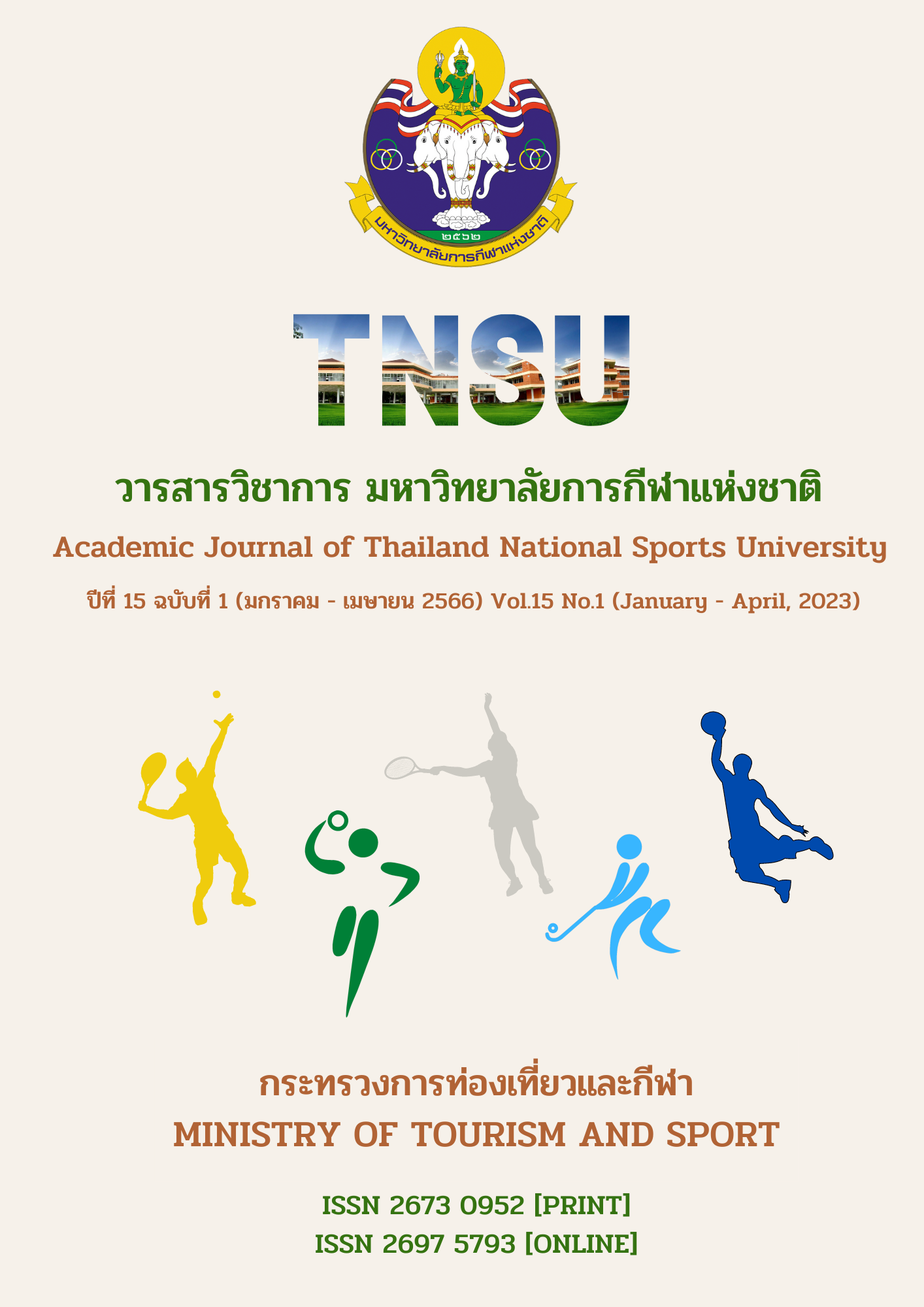EFFECTS OF SEPAK TAKRAW LEARNING MANAGEMENT - BASED NEOHUMANIST APPROACH PLAN ON SPORT SCIECE FOR SEPAK TAKRAW COURSE OF SISAKET RAJABHAT UNIVERSITY
Main Article Content
Abstract
This research aimed to develop and study the effects of Sepak Takraw - based – Neo - Humanist approach learning management plan. The samples were 30 students of Sisaket Rajabhat University who were enrolled in sport science for Sepak Takraw subject of Sport Science division. They were divided with purposively sampling into experimental and control groups, 15 for each. The research instruments were: - (1) Sepak Takraw - based Neo - Humanist approach learning management plans, and (2) the basic skill of Sepak Takraw test. The experimental group was trained by using Sepak Takraw - based Neo - Humanist approach learning management plan for 8 weeks, 3 times a week, 60 minutes a day. Data analysis was accomplished by using means, standard deviation and t - test. The results of the research were as follows:
1) There were 4 developed learning management plans with statistical value of 0.79 for Sepak Takraw based on Neo-Humanist approach in this research. These learning management plans had 5 steps for learning process; (1) preparation / warm up and potential development step, (2) presentation step, (3) practice step, (4) production for fun step, and (5) conclusion or warp up step. The 4 activities based on Neo - Humanist approach for these learning management plans were meditation, yoga, positive words and love, and music for brain wave.
2) The Sepak Takraw - based Neo - Humanist approach learning management plan was able to develop the basic of Sepak Takraw of the experimental group which was significantly better than prior to experiment and better than that for the control group at 0.05 level.
Article Details

This work is licensed under a Creative Commons Attribution-NonCommercial-NoDerivatives 4.0 International License.
The published article is a copyright of the Academic Journal of Thailand National Sports University. The passage appeared in each article in this academic journal is a perspective of each author which is not related to the journal. Each author is required to be responsible for all components of his/her own article. If there are any mistakes, each author must be responsible for those mistakes on his/her own.
References
Bhowmik, S. (2017). Neo - Humanism in practice stimulating physicopsychic environment: A case study of Neo - Humanist Schools. European Academic Research, 1(7), 3094 - 3116. Retrieved from https://www.euacademic.org/UploadArticle/3288.pdf
Department of Physical Education. (2016). Sepak Takraw trainer handboo, T - Certificate: Sepak takrow coaching guide (3rd ed.). Bangkok: Office of Printing Business War Veterans Organization of Thailand Under royal patronage.
I Ketut Semarayasa, Soegiyanto K. S., Setya Rahayu, & Taufiq Hidayah. (2016). Impact of smartphones on the achievement of sepak takraw learners. Retrieved from https://www.researchgate.net/publication/330921148_Impact_of_smartphones_on_the_achievement_of_sepak_takraw_learners
Kiattiwat Watchayakarn. (2017). Skills and Instructional Sepak takraw Sport. Bangkok: Chulalongkorn University Press.
Komkrissada Chaimongkol. (2016). Efforts of sepak takraw teaching and learning based on neo humanist towards playing ball with foot inside (Master’s thesis), Chulalongkorn University. Retrieved from https://www.tdc.thailis.or.th/tdc/
Kosni, N. A., Abdullah, M. R., Juahir, H., & Malik, A. B. H. M. (2017). Establishing reliability of performance indicator of sepak takraw using notational analysis. Journal of Fundamental and Applied Sciences, 9(2). 1 - 11. Retrieved from https://www.researchgate.net/ publication/319122289_Establishing_reliability_of_performance_indicator_of_sepak_takraw_using_notational_analysis
Maseleno, A., & Hasan, M. M. (2012). Finding kicking range of sepak takraw game: Fuzzy logic and dempster - shafer theory approach. Indonesian Journal of Electrical Engineering and Computer Science, 2(1), 186 - 193. Retrieved from https://www.researchgate.net/ publication/303808344_Finding_Kicking_Range_of_Sepak_Takraw_Game_Fuzzy_Logic_and_Dempster-Shafer_Theory_Approach
Montgomery, O. (2020). Neo humanist Education supports environment conducive for learning Neo humanist education. Retrieved from https://redhouseacademy.org/author/administrator/
Nantanat Naraphaksunthorn. (2012). Effects of physical education management based on neo - humanist toward students’ achievement in junior high school (Master’s thesis), Chulalongkorn University. Retrieved from https://www.tdc.thailis.or.th/tdc/
Piyanan Sopin. (2021). Effect of neuromuscular coordination training and skill training on ability of inside kick skill in takraw among grade six students. Journal of Faculty of Physical education, 24(2), 59 - 68. Retrieved from http://ir-ithesis.swu.ac.th
Rangsarit Boonchalor. (2015). Sepak Takraw and Takraw through the loop. Pathumthani: Sky books.
Sakkayapab Boonbal. (2011). Sepak Takraw Sports Skill Training. Bangkok: Odeon.
Sulaiman, N., Adnan, R., & Ismail, S, L. (2014). Differences in game statistics between winning and losing teams in inter - university elite male sepak takraw tournament: A pilot study. Proceedings of the International Colloquium on Sports Science, Exercise, Engineering and Technology (ICoSSEET 2014). Springer, Singapore. https://doi.org/10.1007/978-981-287-107-7_15.
Suppawan Vongsrangsap. (2017). Principles and methods of teaching Takraw. Kasetsart University. Kamphaeng Saen Campus, Nakhon Pathom (Thailand). Faculty of Education and Development Sciences.
Yahya, E. N., Raibowo, S., Yarmani, Y. & Prabowo, A. (2021). Project based blended learning to improve students creativity in sepak takraw. Kinestetik: Jurnal Ilmiah Pendidikan Jasmani, 5(2), 300 – 309. https://doi.org/10.33369/jk.v5i2.14542


